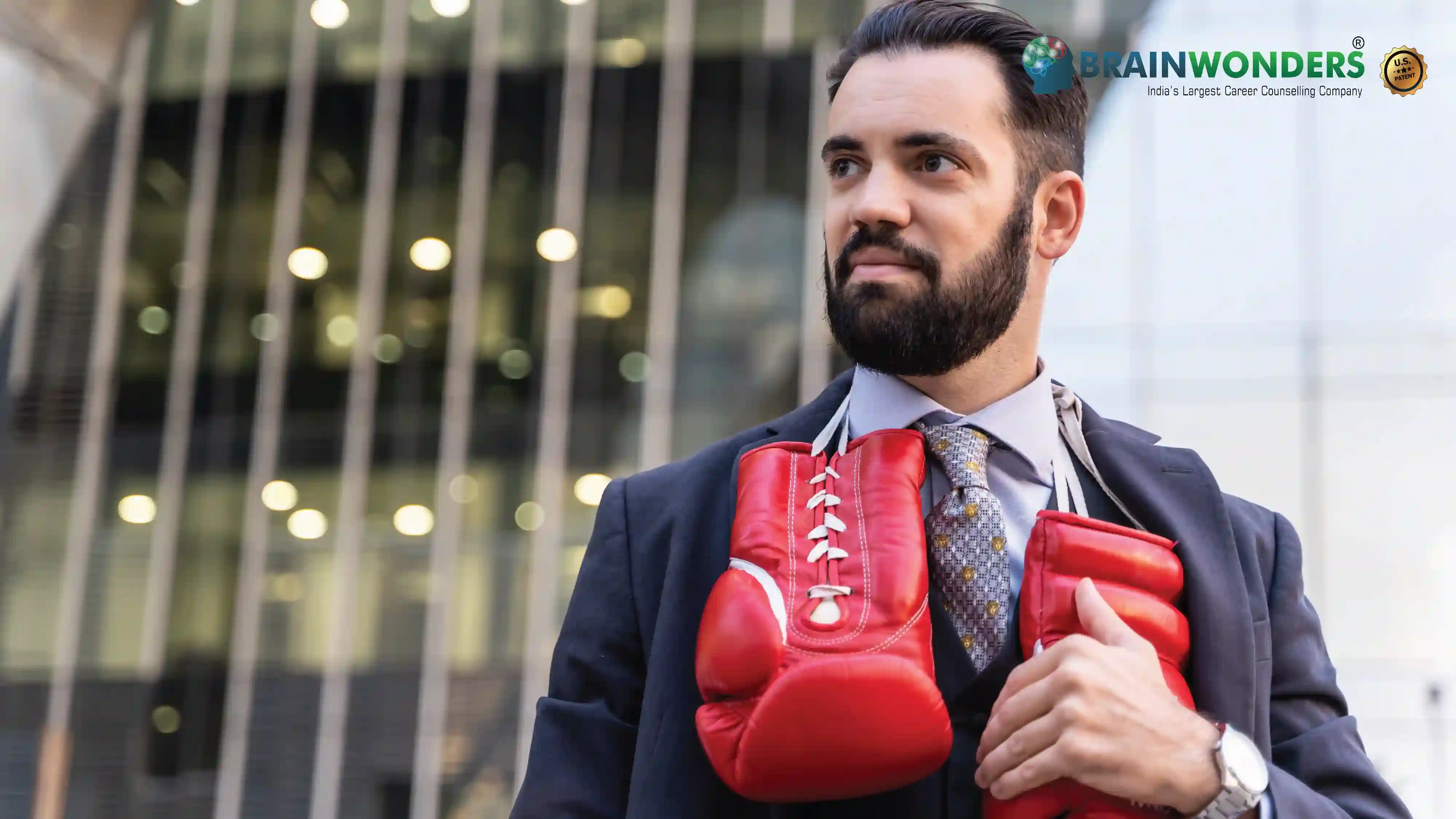How to become a Boxer
Overview, Courses, Exam, Colleges, Pathways, Salary

Overview
Who is Boxer ?
Boxers are individuals who are trained in the combat sport of boxing wherein they compete in hand-to-hand boxing matches. These matches take place in square rings, with the boxers wearing cushioned gloves and protective headgear. A boxer’s age, physical fitness, and medical status are important factors that determine their ability to compete in boxing matches professionally. These professionals tend to compete in a specific category such as bantamweight, heavyweight, or flyweight. They spend a majority of their professional life training in boxing clubs and gyms in order to develop and maintain their strength.
They work hard consistently in order to keep their bodies in tremendous physical condition by continually managing their diet and lifestyle in favour of physical fitness. They start out by competing in local and national tournaments. With success in certain high profile tournaments, these boxers can be selected for competing at international level matches, Olympics, and Commonwealth games. Those boxers who are highly skilled and popular can be signed by professional boxing promoters who act as agents by arranging pro fights and promoting these professionals.
Typical day at work
What does Boxer do?
- Regularly exercise to build physical strength and agility
- Practice with the training partners in the ring to improve technique
- Meet with the trainers to get input regarding areas of improvement and the performance overall
- Keep updated regarding new techniques or moves, tactics for winning and the specific rules of boxing
- Discuss with the trainer to come up with training plans for to best utilize one’s strengths and identify areas of weaknesses
- Consult with dieticians and nutritionists regarding the diet and lifestyle needed to support the physical training undertaken
- Attend networking and promotional events
- Participate in competitions, tournaments, and trials for international or national level matches
Abilities and Aptitude needed
What are the skills, abilities & aptitude needed to become Boxer?
Quickness This is the ability that will allow you to succeed in the ring. You must be faster than your opponent. You have a significant advantage if you can move before he hits you and land a punch before he moves. A quick athlete can learn the skills needed to be successful in the ring. A fighter who lacks quickness risks being severely injured every time he enters the ring. Punching Precision Boxing requires you to hit a moving target.He wants to avoid the blow while you are sizing up your opponent and preparing to punch him.
If you miss with your punches, you will expend energy and give him a chance to hit you with a hard punch. If you land a punch, you gain confidence and weaken your opponent. Punching Strength Boxers require explosive strength in order to develop punching power. It is not, however, about lifting weights in the gym or adhering to a strict exercise regimen. It all comes down to timing, coordination, and spotting an opening. All of these are developed in the gym during training sessions.
Mike Tyson (shown above) was one of the most powerful punchers in the last 50 years. He was frequently looking up at his opponents, who could probably lift more weight and were bigger. Defense When you're in the ring, you have to defend yourself at all times. You must prevent your opponent from hitting your most vulnerable areas with powerful punches designed to injure you. Avoiding or blocking these punches is part of developing a strong defence. This can be accomplished through movement, arm and body positioning, and the use of your powers of observation. When you're fighting your opponent, you're paying attention to everything he does. You notice that he likes to double up on his jab or throw a quick hook off of it after he fires it.
Conditioning It is not sufficient for a boxer to develop the skills required to throw accurate or powerful punches. It's important to be able to defend yourself and avoid punches, but it's not enough. A fighter must train for endurance so that he can do this for a long period of time. A fighter's athleticism or punching skills may dominate for a round or two, but by the 10th or 11th round, after competing for 30 minutes or more, he may become exhausted. That means he is at risk of being seriously injured. A great fighter can go 10, 11, or 12 rounds without tiring. This implies that he must be in exceptional shape, which necessitates putting in maximum effort while training.
Discipline A fighter who works hard in the gym is on his or her way to developing the discipline required for ring success. Hard training, on the other hand, is insufficient. You must conduct yourself outside of the ring in a way that will help you succeed inside the ring. That includes watching what you eat and drink, as well as making sure you get enough sleep. This includes staying out of trouble when you're not in the ring or training. Guts You can call it guts or courage. It's one of the most underappreciated qualities that all boxers require. When you enter the ring, you will face an opponent who will attempt to hit you with hard punches and injure you.
Even the best fighters are hit hard during a fight. You are aware of this in advance. It takes bravery to enter the ring and fight knowing you will be hit. It takes even more guts to continue fighting with discipline and precision after being injured. Intelligence Boxing is known as "the sweet science." Critics may mock that self-important nickname, but there is some truth to it. Watch two skilled boxers in the ring, and it's all about strategizing and utilising your strengths against your opponent's weaknesses. This necessitates intelligence. You must anticipate what your opponent will do in the ring and devise strategies that will allow you to perform at a high level.
Salary
Salary for Boxer?
A "Boxer" salary can vary significantly based on factors such as their level of experience, achievements, fame, endorsement deals, and the type of fights they participate in (amateur or professional).
- Minimum Monthly Salary: The monthly salary for amateur boxers or those starting their careers can be INR 10,000.
- Maximum Monthly Salary: The monthly income can be from INR 10,00,000 to INR 50,00,000.
- Annual Salary: The annual salary of a boxer can be from INR 1,20,000 to INR 6,00,00,000.
- Highest Paying Job and Scope: The highest paying job for a boxer is to be a successful professional boxer competing at the top level and participating in high-profile championship bouts. The scope for boxers is highly competitive and challenging. To reach the highest level and earn substantial incomes, boxers must showcase exceptional skills, win key matches, and gain recognition in the boxing community.
Pathways
How to become an Boxer?
Entrance Exam
Entrance Exam for Boxer ?
Courses
Which course I can pursue?
Best Colleges
Which are the best colleges to attend to become an Boxer?
Industries
Which Industries are open for Boxer?
- Olympics
- Common wealth games
internship
Are there internships available for Boxer?
There are no academic requirements to become a professional boxer. To thrive in this sport, you will simply need natural talent, determination, strength, technique, discipline and the ability to land a well time and powerful punch.
If you really want to “ Float like a butterfly and sting like a bee” you will have to train everyday with the guidance of your trainer you will refine your technique, build your strength, increase your stamina and work on combos, different kinds of punches, footwork and strength.
Career outlook
What does the future look like for Boxer?
Since boxing is a popular spectator sport that garners a fair amount of public interest, the demand for professional boxers is high. Instead of a salary, boxers earn by winning money for participating in or winning each boxing match. Their weight class, skill level, popularity, and experience in the field are some of the factors that determine how much the boxer shall be paid. Given the nature of their work, boxers need to invest in healthcare insurance, along with travel and training expenses. They can also make money through sponsorships and endorsements.
After building a reputation for themselves in the industry or retiring from the ring, boxers often tend to stay in the field by working as boxing coaches. In order to secure more opportunities, boxers are often associated with boxing teams and clubs. Most of their time is spent in boxing gyms for training, however, they do not necessarily follow a regular schedule. They often work for long hours during evenings and on weekends, with occasional travel to the match venues.





.webp)

